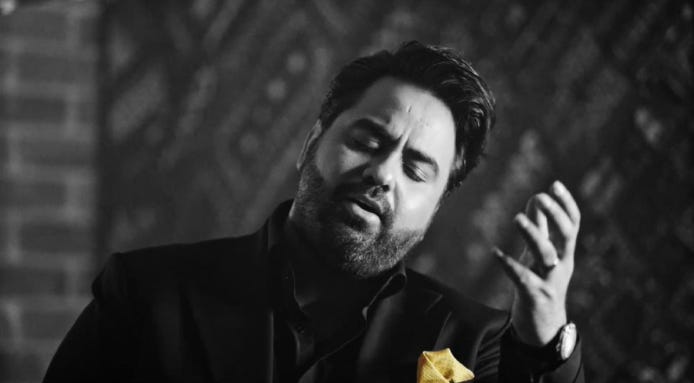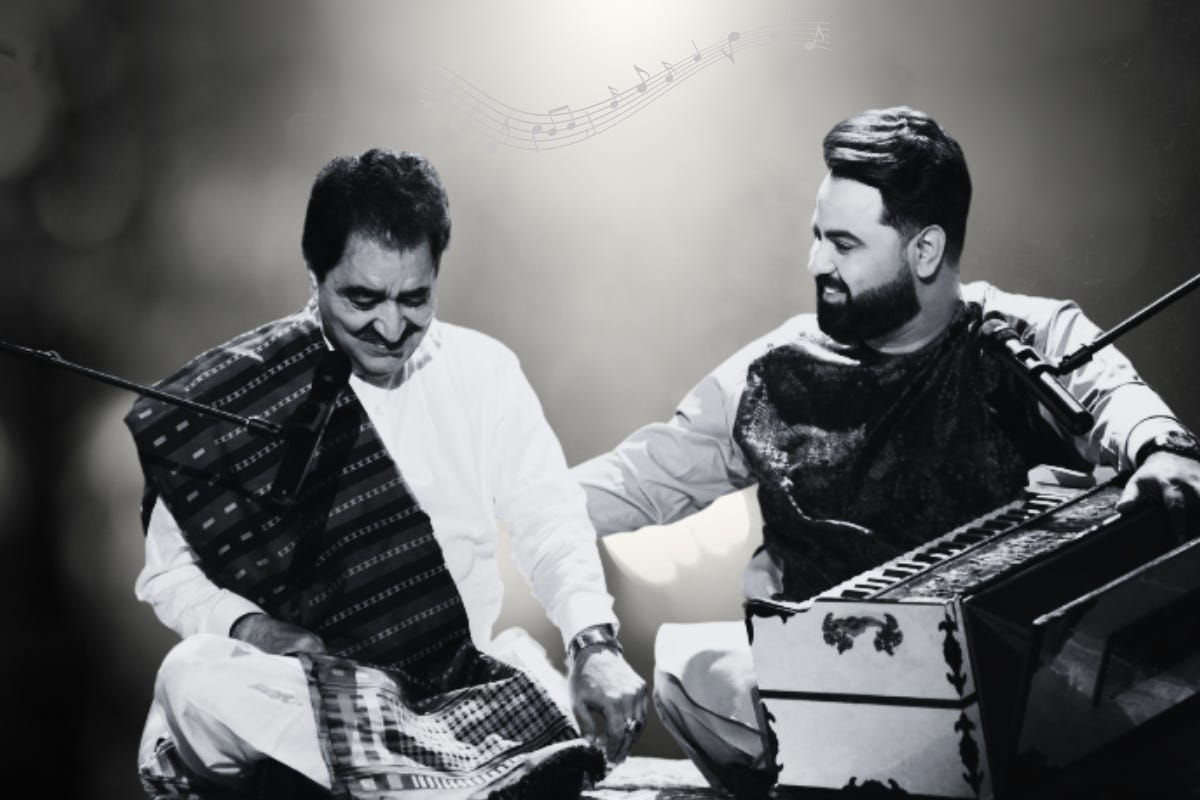“The goal is to die with memories, not dreams.” - Qais Ulfat
In the world of music, there are certain voices that distinguish themselves, emanating a unique energy that vibrates with the heartbeat of a culture. Qais Ulfat, one of Afghanistan's most beloved singers, personifies this. His melodious voice is not just an expression of tunes, but a reflection of the spirit and rich heritage of his homeland. This makes him more than just a singer; Qais Ulfat is a cultural phenomenon, illuminating the beauty of Afghan music on the world stage.
His journey as a musician began in New Delhi when he was only five years old. Delhi was a sanctuary that sheltered his displaced family and nourished his talent. It was here, under the watchful eyes and expert guidance of his father Ustad Ulfat Ahang and later his uncle, Ustad Fazel Ahmad, that the young Qais immersed himself in the art of playing the harmonium and tabla. These instruments, his earliest companions in the world of music, went on to form the bedrock of his distinguished musical career.
My own journey of musical discovery shares a serendipitous parallel with Qais Ulfat's. Just as he found his musical calling in the bustling heart of New Delhi, India, it was in this very city where I too nurtured my fondest childhood memories. My personal taste in music was deeply influenced during my time there in the early 90’s, specifically by the spiritual experiences at the shrine of Nizamuddin Auliya. This sacred place, with its soulful melodies echoing through the centuries and its air laden with profound mysticism, stirred something within me. These experiences remain vivid, resonating in my heart, and they are memories that I carry and cherish to this very day.
The Ulfat family’s odyssey led them from India to Canada, which became their new home. Here, Qais continued his musical pursuits, now exploring the artistry of keyboard and music arrangement. It’s here where he started to work alongside several renowned Afghan artists, his talent enriching the Afghan diaspora's musical tapestry in Canada.
International recognition came knocking when Qais signed up as a coach for the television show "The Voice of Afghanistan." As one of the judges, Ulfat brought a charismatic blend of talent, passion, and professional critique to the table. He engaged audiences at home and around the world with his vibrant personality and deep understanding of music.
During his time in Afghanistan, Qais also took on a pivotal role in leading Barbud Music, a noble initiative that aims to preserve and promote the rich musical heritage and original culture of Afghanistan. Under his guidance, Barbud Music not only focused on the local and traditional elements of Afghan music but also worked on a global scale through its digital presence and online distribution platforms. Today, Barbud Music, in collaboration with artists from across the globe, curates and disseminates high-quality content, aptly catering to contemporary music trends and artists. In doing so, it beautifully harmonizes the traditional melodies of the past with the modern rhythms of the present world.
In a landscape where many artists choose to modernize by shedding their traditional roots, Qais’s approach to integrating modern musical elements while preserving the cultural essence of his music has set him apart. His performances reflect a profound respect for his heritage, showcasing the lyrical beauty of Farsi, Pashto and Hindi.
Through his artistry, Qais taps into the shared experience of Afghans, his music a poignant commentary on their history, their struggles, and their spirit. He captures both the nostalgia for a peaceful past and the yearning for a harmonious future.
Roots of his musical knowledge run deep. His father, after all, was a protégé of Ustad Sarahang, one of Afghanistan's finest. Being the son Ustad Ulfat Ahang, Qais therefore inherited not only the name but also a profound musical legacy. He is the living embodiment of Afghanistan's rich musical history, a history that pulses through his veins, fuels his passion, and inspires his soul.
In 2008, Qais officially unveiled his artistic persona to the world, launching his first hit single, "Chashmaane Mast". Fifteen years later, his songs still resonate, with his latest track "Du Zolfanat" released in June 2023.
Adept in Semi-Classical, Light Ghazal, Ghazal, and Pop genres, Qais's musical versatility knows no bounds. He is a multitalented virtuoso: a singer, an instrumentalist, a music arranger, a composer, and the proud owner of Shahzada Records, his personal music studio.
His contribution to Afghanistan’s music extends beyond his personal performances. Qais has aided many Afghan artists, including Hangma, Najim Nawabi, Wahid Qasimi, Shekeb Osmani, Walid Soroor, Freshta Sama, Shadkam, and others in arranging their music.
Amidst all his accomplishments, his heart and destiny, I believe belongs to Ghazal, a genre that connects him to his roots. If Ahmad Zahir was Afghanistan's Elvis Presley, Dr. Nashenas its Saigal, and Farhad Darya, its U2, then in my humble opinion, Qais Ulfat holds the potential to be Afghanistan's Jagjit Singh. As an ardent admirer of Jagjit Singh, I have found the echoes of his virtuosity, talent, and soulful voice in Qais’s performances.
Qais Ulfat is known as the 'Shahzād-e Ghazal,' or 'The Prince of Ghazal.' This title is far from decorative; it's a testament to his profound connection with Ghazal music, a genre he initially embraced and should consider rekindling. His journey began as a Ghazal singer, and I believe it's in this art form where his inherent talents truly shine. His ability to convey profound emotions and narratives through his melodious voice echoes the very soul of Ghazal, the essence that has captivated audiences for centuries.
While it is understandable that classical or even semi-classical Ghazal music might not command widespread appreciation among all Afghans, it is precisely in this niche where an artist's unique voice resonates most powerfully. It's crucial for an artist to remain faithful to their craft and resist the lure of mass appeal. The legacy of Ghazal is not founded on fleeting popularity but on its profound beauty, depth, and enduring tradition.
Consider the comparison between Ghazal and an aged wine. Both require time, patience, and a nuanced understanding to fully appreciate. Their richness unfolds delicately, enchanting those with the patience and the palate to savor them. On the other hand, pop music can be likened to an easy, cheap alcoholic drink - it may offer instant gratification, but it lacks the complex layers and lasting impact of its more refined counterpart.
I hope to see Qais Ulfat align more with Ghazal in his work, and less with pop. He is undoubtedly a shining star, but his potential goes beyond a transient glimmer. He could etch his name among the permanent constellations, along with greats like his father and Ustad Sarahang, if he can resist the temptation of momentary social media fame.
Qais has shown us glimpses of his potential to contribute to the rich tradition of Ghazal, demonstrating his capability to breathe new life into this genre while preserving its essence. By continuing to hone his craft within the beautiful realm of Ghazal, he stands to further the legacy of this charming art form, creating a lasting impact that resonates through time.
And so, as a fervent admirer of both Ghazal and Qais Ulfat, I hope to witness a harmonious marriage of the two. The beautiful voice of Qais, harmonizing with the soulful verses of Ghazal, can form a symphony that transcends time, uniting the past, the present, and the future in a melodious embrace.
In conclusion, I wholeheartedly wish Qais Ulfat all the best in his artistic endeavors. As he navigates the intricate world of music, may he find the courage to stay true to his roots, further the legacy of Ghazal, and enrich the lives of those who listen to his work. I hope that Qais continues to remain resilient in the face of fleeting trends, and instead, steadfastly contributes to the beautiful, age-old tradition of Ghazal.
In the words of the legendary Ghazal maestro, Jagjit Singh, "The moment you start thinking you're good, you're gone. Everything you do, you can do better." As a fan of Qais Ulfat, I see this potential for endless growth and improvement in him. His journey has just begun, and the road ahead promises more melodies, more soulful verses, and an even more resonant echo of Ghazal in the world. Here's to the inspiring journey of Qais Ulfat, the Shahzad-e Ghazal, and the magnificent melodies yet to come.









